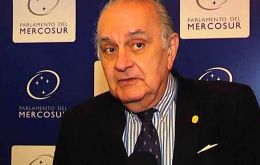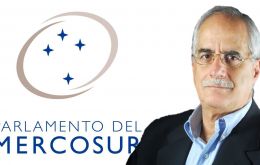MercoPress. South Atlantic News Agency
Mercosur
-
Wednesday, February 10th 2016 - 07:08 UTC
London's position on Falklands 'unchanged', says UK ambassador in Spain

The United Kingdom will not change current policy on the Falkland/Malvinas Islands, according to the UK Ambassador to Spain Simon J. Manley, confirming London's stance on the Islands sovereignty.
-
Wednesday, February 10th 2016 - 02:33 UTC
Falklands: Back to the future, why the 'new approach' from Argentina is completely missing the point

By the Honourable Mike Summers, OBE (*) - Over the weekend of the 6th and 7th February, the press in Argentina reported that the Government of Argentina (GoA) was going to change its approach to its treatment of the Falkland Islands, its relationship with the United Kingdom and how it intends to “resolve the Falklands question”
-
Saturday, February 6th 2016 - 07:57 UTC
Pollack statement: “pleased to report that enormous progress has been made”

Daniel A. Pollack, Special Master presiding over settlement negotiations between the Republic of Argentina and its “holdout” Bondholders issued the following statement today (Friday, Jan 5):
-
Saturday, February 6th 2016 - 07:00 UTC
Argentina close to a full agreement with holdouts: US$ 6.5bn offer to end the litigation

Argentina offered a $6.5 billion cash payment to creditors suing the country over defaulted bonds on Friday, seeking to end an exhausting 14-year legal battle, “the sovereign debt trial of the century”, that transformed the country into a financial markets pariah. Two out of six leading bondholders have already accepted the offer, the U.S. court-appointed mediator said, hailing the proposal by Argentina's new, business-friendly government as an “historic breakthrough”.
-
Saturday, February 6th 2016 - 06:22 UTC
Falklands' population in 'constrictive' trend, says Argentine team on the field

The Falklands' population composition can be described as 'constrictive' since there is a tendency to ageing in the population pyramid, in other words there are more elderly people than children. Comments belong to a member of an Argentine team of geography and migration experts from a university in Santa Fe province (Universidad Nacional del Litoral, UNL), who have been granted scholarships to collect such data from the Islands, based on a project the team presented.
-
Saturday, February 6th 2016 - 05:31 UTC
Brazil's inflation at 12-year high in January driven by food and transportation prices

Brazil's inflation rate rose to a 12-year high, officials said on Friday, as Latin America's largest economy continues to struggle through a protracted recession. Driven by rising food prices, the annual inflation rate hit 10.71%, the highest since November 2003 and well beyond the central bank's target ceiling of 6.5%, said national statistics institute IBGE.
-
Wednesday, January 27th 2016 - 06:42 UTC
Parlasur could invite Falklanders', but first Macri must cracks the “chavista axis”

The Argentine representation in the Mercosur parliament, Parlasur, is considering inviting a group of 'kelpers' Falklands/Malvinas lawmakers, 'to listen to their needs and promote cooperation, but in the framework of Argentina's unrenounceable sovereignty claim over the Islands'.
-
Monday, January 4th 2016 - 06:35 UTC
Argentine ex foreign minister Taiana speaker of Mercosur parliament during 2016

Argentina's former foreign affairs minister under ex president Cristina Fernandez, Jorge Taiana has been nominated speaker of the Mercosur Parliament in Montevideo, as of this month and year.
-
Wednesday, December 30th 2015 - 14:10 UTC
Two ex ministers with prison sentences for Buenos Aires train accident that killed 51 and injured 789

An Argentine court handed down prison sentences of up to nine years for those charged in the February 2012 train accident in Buenos Aires that killed 51 people and injured more than 700.
-
Wednesday, December 30th 2015 - 02:24 UTC
Russian polar vessel and helicopters will supply Argentine Antarctica bases

For the eighth season, Argentina's Antarctic bases and stations are to be supplied by the Russian polar vessel Vasily Golovnin from Arkadia Ltd. This has been going on since 2007 when the Argentine flagship ice-breaker Almirante Irizar caught fire in the high seas and is still in repairs waiting for the necessary funds.
